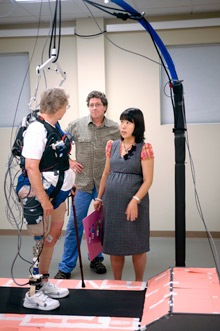He (Helen) Huang, PhD, assistant professor with the University of Rhode Island (URI), Kingston, Department of Electrical, Computer, & Biomedical Engineering has received a $520,000 grant through the National Science Foundation (NSF) Faculty Early Career Development Program to systematically investigate and quantify the interactive effects between individuals with lower-limb amputations and powered prostheses.

Marjorie Brasier, a retired Warwick teacher who lost her leg in a drunk-driving accident, prepares to walk on a treadmill as Michael Nunnery, CPO, Nunnery Orthotic & Prosthetic Technologies, Kingston, Rhode Island, and Huang test a stumble-detection system for prostheses.
Photo by Michael Salerno Photography, courtesy of the URI Department of Communications & Marketing.
Huang, who is also the director of the URI Neuromuscular Rehabilitation Engineering Laboratory, said she wants to “seamlessly integrate the powered prostheses with lower-limb amputees so they can walk naturally, transition across terrain, and allow the person to do many tasks and transition between tasks in a normal way.”
She is already working with individuals with transfemoral amputations and testing their use of powered prostheses as they walk up ramps, climb stairs, and traverse level ground. By combining multiple streams of information from the prosthesis, its user, and the environment, she has developed an algorithm that she believes will help to interpret user intent during transitions so they may have better control of powered prosthetic legs.
“The person is going to wear this powered prosthesis like a robot, but the robot doesn’t know what the person wants to do next,” said Huang. “The first time they try it, it’s going to be awkward. They’re going to have to learn how to use it, and we’re going to study how they adapt to it. We want to quantify how they change their neuromuscular control when they adapt to the prosthesis.”
In the future, Huang plans to combine her powered prosthesis research with her work to create a stumble-detection system for prostheses so users can recover safely from slips and trips. In addition, she will work with physical therapists and other clinical professionals to ensure that the final product can be easily incorporated into the current system of prosthesis fitting and therapy.




